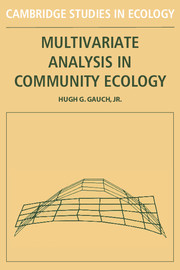Summary
Community ecology concerns assemblages of plants and animals living together and the environmental and historical factors with which they interact. The domain of community ecology within biology as a whole may be characterized better by the spatial and temporal scales of principal interest rather than by other criteria such as conceptual viewpoint or methodology (Osmond, Björkman, & Anderson 1980). Community ecologists study living things principally on a spatial scale of meters to kilometers and a time scale of weeks to centuries. Phenomena beyond these spatial and temporal scales although relevant to community ecology and its interdisciplinary character, are studied mainly by biologists who would not be classified as community ecologists.
The community-level viewpoint is a major sector of ecology, receiving attention for many theoretical and applied purposes. Even when an ecologist's principal interest is more specific, however, such as the distribution of a particular species or the impact of a particular pollutant, much insight may result from preliminary or complementary community studies (Poore 1956, 1962; Foin & Jain 1977).
Multivariate analysis is the branch of mathematics that deals with the examination of numerous variables simultaneously: “The need for multivariate analysis arises whenever more than one characteristic is measured on a number of individuals, and relationships among the characteristics make it necessary for them to be studied simultaneously” (Krzanowski 1972). Community data are multivariate because each sample site is described by the abundances of a number of species, because numerous environmental factors affect communities, and so on.
Information
- Type
- Chapter
- Information
- Multivariate Analysis in Community Ecology , pp. 1 - 42Publisher: Cambridge University PressPrint publication year: 1982
Accessibility standard: Unknown
Why this information is here
This section outlines the accessibility features of this content - including support for screen readers, full keyboard navigation and high-contrast display options. This may not be relevant for you.Accessibility Information
- 2
- Cited by
